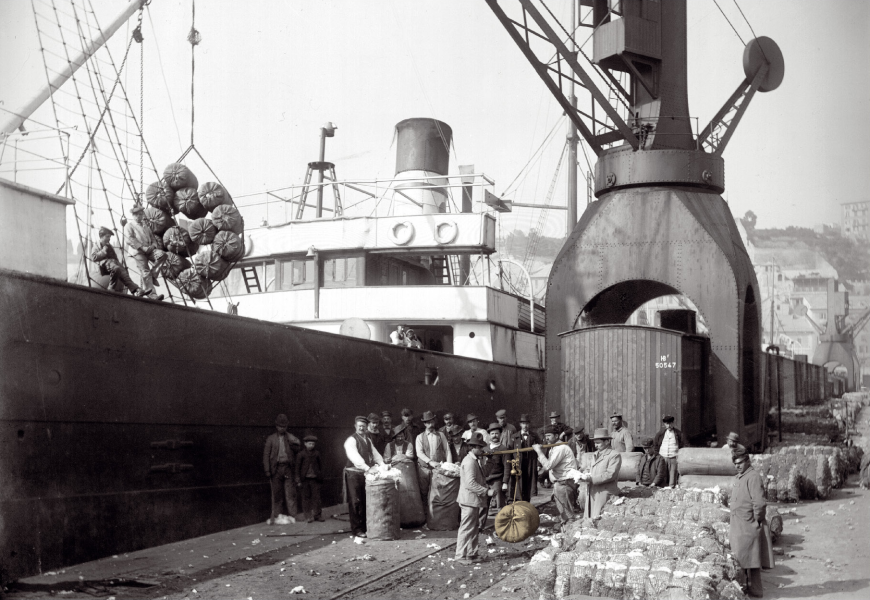La Compagnia dei Caravana

Sbarco di balle di cotone da un piroscafo. Notare la bilancia a spalla e i vagoni del treno merci che arrivano sul molo passando sotto le gru. Siamo a inizi Novecento e già c’è una perfetta integrazione logistica // Unloading of cotton bales from a steamer. Notice the scale on the shoulders and the freight train wagons approaching the quay under the cranes. It’ s the early 20th century and the logistical integration is already perfect.
Dalle valli di Bergamo, gli scaricatori del porto
L’11 giugno 1340 la Compagnia dei Caravana (dall’arabo ‘carwan’ che significa ‘società’) scrive il suo statuto e definisce i rapporti tra gli scaricatori di merci e il Comune di Genova. Dal 1487 si specifica anche come l’accesso a questo lavoro sia esclusivo dei nativi di Bergamo, della Val Brembilla e della Val Brembana. Dal 1576 si accetta in Compagnia solo chi abbia la cittadinanza bergamasca. Per garantirsi questo monopolio, le donne tornavano ai paesi d’origine al momento del parto affinchè anche i figli potessero godere del medesimo diritto dei loro padri. è probabile che l’esclusività concessa ai lombardi derivi dalla volontà di avere lavoratori estranei alle lotte tra fazioni cittadine in un ambito, quello del porto, economicamente rilevante.
Il lavoro dei caravana consisteva nel carico e scarico delle mercanzie dalle imbarcazioni e il loro stoccaggio nei magazzini portuali: il compito era pesante anche perché i prodotti venivano ammassati senza ordine apparente nelle stive. Col passare del tempo è documentato l’uso distintivo, da parte dei caravana, di una gonnella di tela di jeans come grembiule, senza tasche così da impedire che vi si potessero nascondere armi o mercanzia.
La Compagnia aveva inoltre una forte funzione di aggregazione e protezione sociale: ai caravana era vietato il gioco, il furto, la bestemmia, la maldicenza, la rissosità; vi erano inoltre consuetudini riguardo il soccorso dei malati che venivano assistiti a spese della collettività e garantendo sepoltura ai defunti in caso di indigenza. Il dialetto d’origine era sicuramente un fattore di coesione e ogni componente riceveva per tradizione anche un proprio soprannome.
Nel 1844 i caravana furono sciolti con la soppressione ufficiale delle organizzazioni di mestiere, per poi rinascere nel 1946, dopo un secolo di lotte, scioperi e manifestazioni, come CULMV (Compagnia Unica Lavoratori Merci Varie).
The Caravana Company
From the Valleys of Bergamo, the unloaders of the Port
On 11 June 1340 the Caravana Company (from the Arabic ‘carwan’ meaning ‘company’) wrote its statute and defined the relationship between the dockers and the Municipality of Genoa. As of 1487 it also specified that access to this work was exclusive to the natives of Bergamo, Val Brembilla and Val Brembana. From 1576 only citizens of Bergamo were accepted in the Company. In order to guarantee this monopoly, women returned to their town of origin to give birth so their sons could enjoy the same rights as their fathers. It seems that the exclusivity granted to the citizens of Lombardy arose from the desire to avoid that those working in the port, a very important financial area, be involved in feuds between city districts.
The Caravana workers were responsible for loading and unloading goods from the vessels and storing them in the port warehouses: it was no easy task, given that the various goods were piled in bulk with no apparent order in the holds. There is evidence that at one point the Caravana workers began wearing a denim apron, with no pockets so that weapons or merchandise could not be concealed.
The Company played an essential role in social aggregation and protection: gambling, theft, blasphemy, slander and brawling were forbidden among Caravana workers; they also had customary practices of pitching in to help the sick and guaranteeing a decent burial for those who could not afford it. Their dialect of origin was certainly a cohesive factor and each member was traditionally given a nickname.
In 1844, the Caravana were disbanded with the official abolition of trade organisations, only to be reborn in 1946, after a century of struggles, strikes and demonstrations, as CULMV (‘Compagnia Unica Lavoratori Merci Varie’- Single company of cargo workers).
